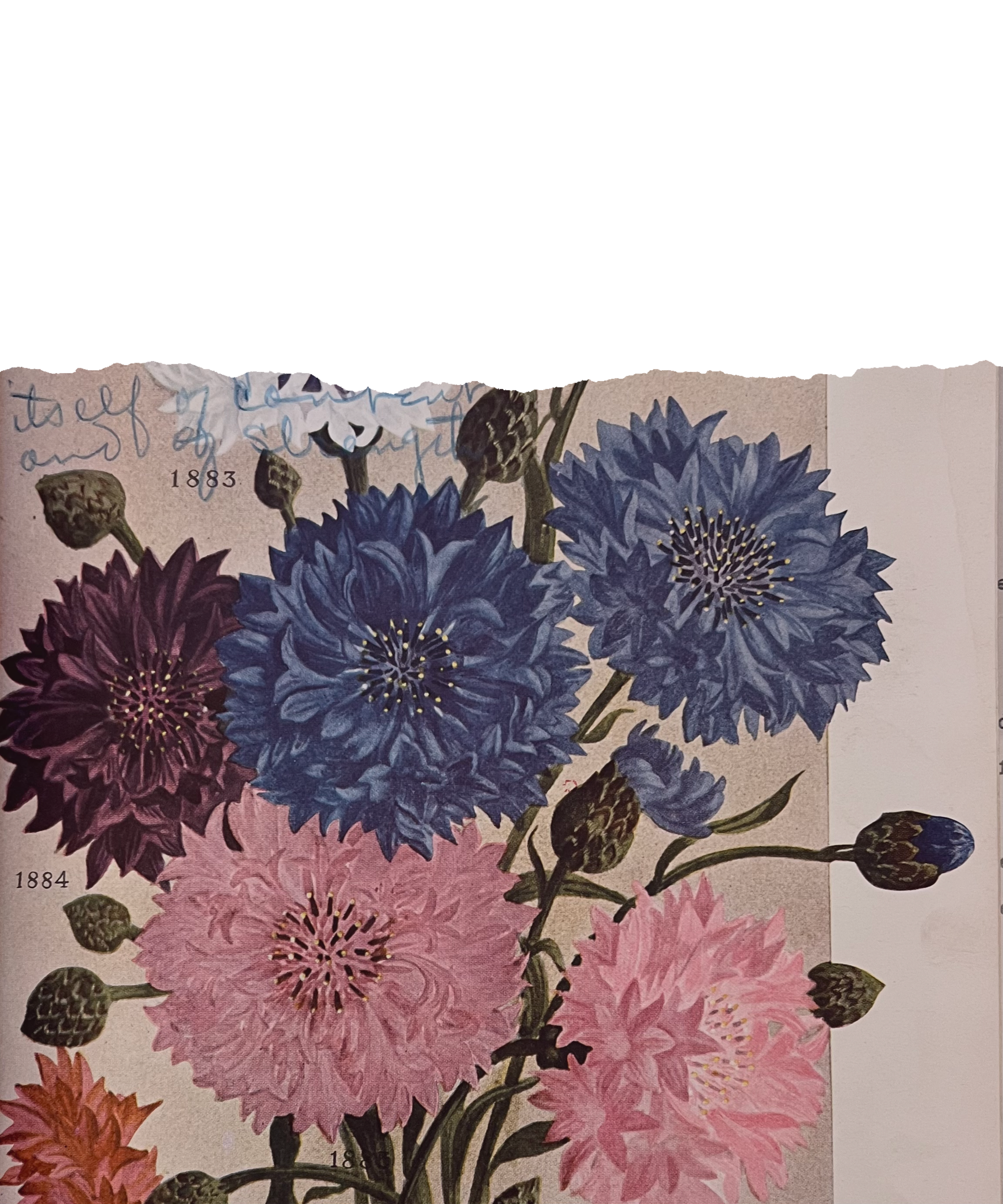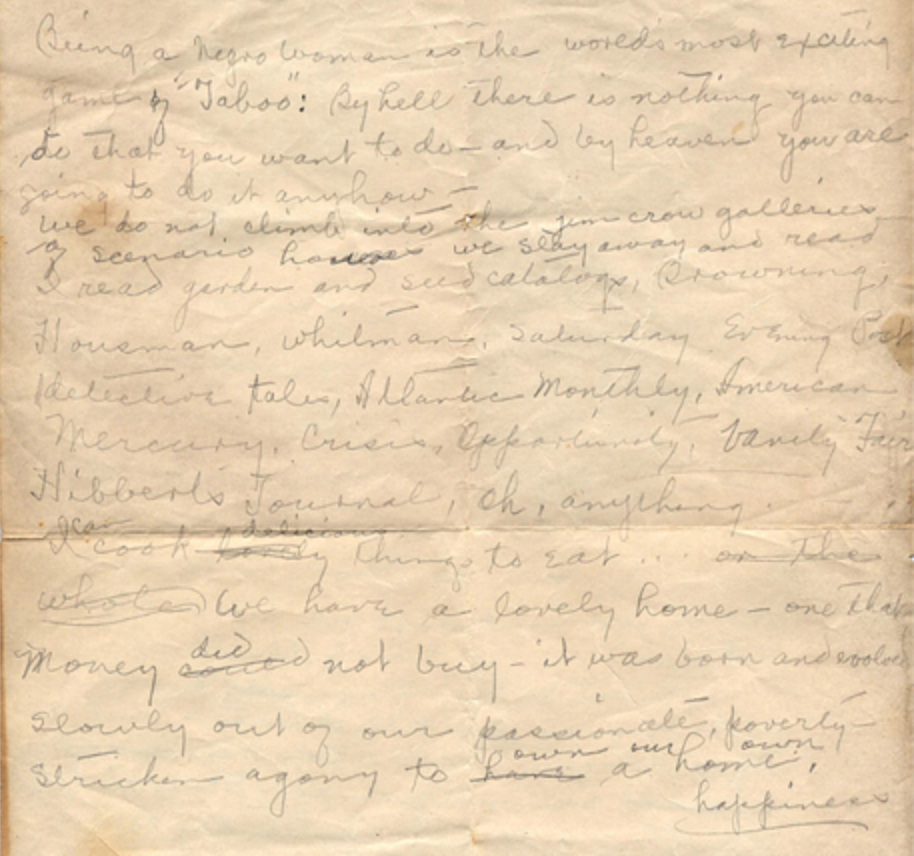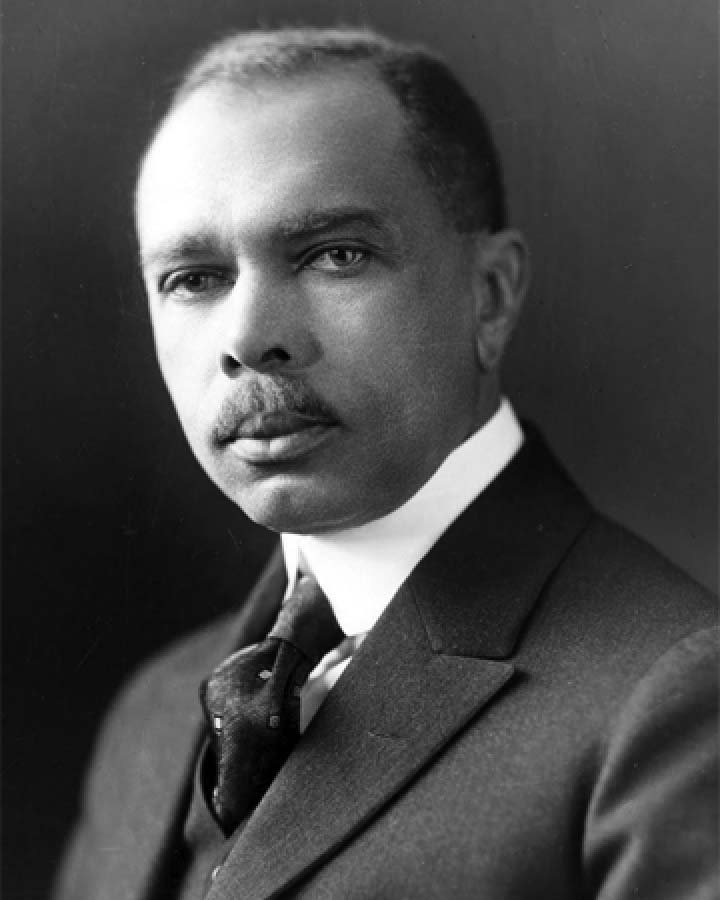
The Poetry of Anne Spencer
It all begins with an idea and paper…
Anne Spencer's poetry, often “scribblings” found on the walls of her home and loose scraps of paper, was written for herself rather than for a public audience. Spencer used language to give voice to her thoughts, reactions, and, quite often, her indignation. She was an outspoken advocate for the rights of all beings: civil rights, women’s rights, rights of respect and dignity due to all people. Although Anne Spencer was interested and involved in a range of activities during her lifetime, if she hadn't been a noted poet during the Harlem Renaissance, her name may not have achieved the kind of international recognition it has today. Yet interestingly, it was her commitment to human equality that led to her fame.
The beginning of a life long friendship…
In 1913, Spencer—and others committed to equal rights for blacks—sought to establish a local NAACP chapter. James Weldon Johnson, writer, critic, and field secretary for the national NAACP, came to Lynchburg in 1919 to reestablish the local chapter and stayed with the Spencer’s. All though he likely would not have stayed elsewhere, by law, as a black man, he was unable to stay in a hotel in Lynchburg at that time.
During this visit, Johnson encouraged Annie Spencer to publish more of her work when he happened upon one of her poems, "Before the Feast at Shushan.", The poem was published in the NAACP journal, The Crisis, in February 1920. This began Spencer’s decade of publication and nearly two decades of friendship with James Weldon Johnson.
A legacy continues…
Several of Spencer’s poems appeared in the Crisis, others in similar journals such as The Lyric. Many appeared as well—both during the Harlem Renaissance and afterward—in anthologies. Her poems are included in Countee Cullen’s Caroling Dusk, Johnson’s The Book of American Negro Poetry, Arna Bontemps and Langston Hughes’ The Poetry of the Negro, and the Norton Anthology of Modern Poetry. Her work continues to be anthologized today.
A Sampling of Anne Spencer’s Poetry…
-
If ever a garden was a Gethsemane,
with old tombs set high against
the crumpled olive tree—and lichen
this, my garden has been to me.
For such as I none other is so sweet;
Lacking old tombs, here stands my grief,
and certainly its ancient tree.
Peace is here and in every season
a quiet beauty.
The sky falling about me
evenly to the compass. . .
What is sorrow but tenderness now
in this earth-close frame of land and sky
falling constantly into horizons
of east and west, north and south;
what is pain but happiness here
amid these green and wordless patterns,--
indefinite texture of blade and leaf;
Beauty of an old, old tree,
last comfort in Gethsemane.
-
Flame-flower, Day-torch, Mauna Loa,
I saw a daring bee, today, pause, and soar,
Into your flaming heart;
Then did I hear crisp, crinkled laughter
As the furies after tore him apart?
A bird, next, small and humming,
Looked into your startled depths and fled. . . .
Surely, some dread sight, and dafter
Than human eyes as mine can see,
Set the stricken air waves drumming
In his flight.
Day-torch, Flame-flower, cool-hot Beauty,
I cannot see, I cannot hear your flutey;
Voice lure your loving swain,
But I know one other to whom you are in beauty
Born in vain:
Hair like the setting sun,
Her eyes a rising star,
Motions gracious as reeds by Babylon, bar
All your competing;
Hands like, how like, brown lilies sweet,
Cloth of gold were fair enough to touch her feet. .
Ah, how the sense reels at my repeating,
As once in her fire-lit heart I felt the furies
Beating, beating.
-
Earth, I thank you
for the pleasure of your language
You’ve had a hard time
bringing it to me
from the ground
to grunt thru the noun
To all the way
feeling seeing smelling touching
—awareness
I am here!
-
“Your garden at dusk
Is the soul of love
Blurred in its beauty
And softly caressing;
I, gently daring
This sweetest confessing,
Say your garden at dusk
Is your soul. My Love.”
-
Turn an earth clod
Peel a shaley rock
In fondness molest a curly worm
Whose familiar is everywhere
Kneel
And the curly worm sentient now
Will light the word that tells the poet what a poem is
-
Life-long, poor Browning never knew Virginia,
Or he’d not grieved in Florence for April sallies
Back to English gardens after Euclid’s linear:
Clipt yews. Pomander Walks, and pleached alleys;
Primroses, prim indeed, in quiet ordered hedges,
Waterways, soberly, sedately enchanneled,
No thin riotous blade even among the sedges,
All the wild country-side tamely impaneled . . .
Dead, now, dear Browning lives on in heaven,—
(Heaven’s Virginia when the year’s at its Spring)
He’s haunting the byways of wine-aired leaven
And throating the notes of the wildings on wing:
Here canopied reaches of dogwood and hazel,
Beech tree and redbud fine-laced in vines,
Fleet clapping rills by lush fern and basil,
Drain blue hills to lowlands scented with pines . . .
Think you he meets in this tender green sweetness
Shade that was Elizabeth . . . immortal completeness!
-
Oh, I who so wanted to own some earth,
Am consumed by the earth instead:
Blood into river
Bone into land
The grave restores what finds its bed.
Oh, I who did drink of Spring’s fragrant clay,
Give back its wine for other men:
Breath into air
Heart into grass
My heart bereft—I might rest then.
-
Being a Negro Woman is the world's most exciting
game of "Taboo": By hell there is nothing you can
do that you want to do and by heaven you are
going to do it anyhow—
We do not climb into the jim crow galleries
of scenario houses we stay away and read
I read garden and seed catalogs, Browning,
Housman, Whitman, Saturday Evening Post
detective tales, Atlantic Monthly, American
Mercury, Crisis, Opportunity, Vanity Fair,
Hibberts Journal, oh, anything.
I can cook delicious things to eat. . .
we have a lovely home—one that
money did not buy—it was born and evolved
slowly out of our passionate, poverty-
striken agony to own our own home.
happiness
Anne Spencer's poetry, photographs, films, intellectual property, and all other properties are protected and copyrighted under the full extent of the law. Permission to use Anne Spencer's poetry, photographs, films, intellectual property and all other properties may only be granted by the proper representatives that presently act on the behalf of the Anne Spencer House & Garden. Museum, Inc. Please inquire here.




